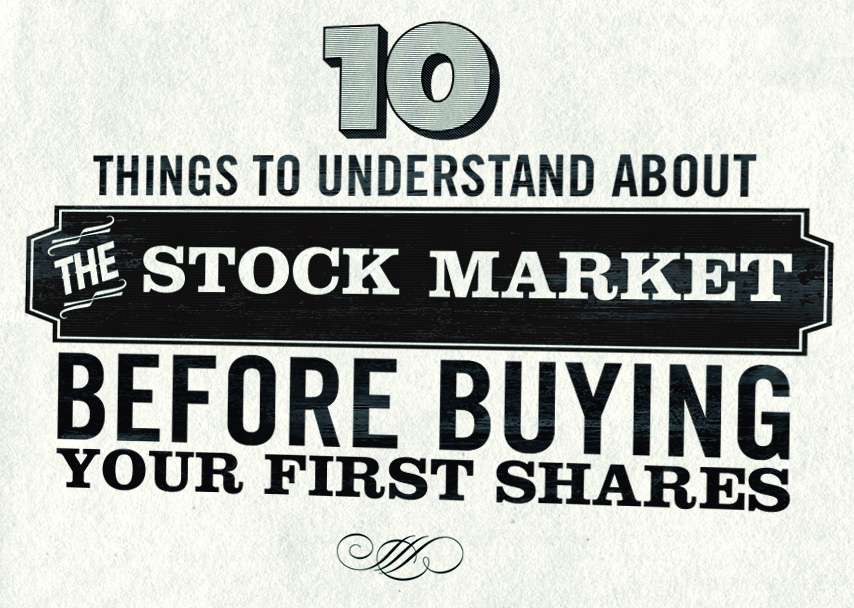Flash forward until you reach your late 40's or early 50's and imagine owning a stock portfolio worth $500,000, $1 million or even a couple of million bucks. To get to there from here works best if you begin investing in the stock market at as young an age as possible. Starting in the market in your 20's will literally pay big dividends down the road. When you start to study stock market investing, the number of investment ideas, strategies, stocks, funds and ways to invest is staggering.
Here are 10 basic pieces of information about the stock market to get you started.
What are stocks?
Shares of stock are pieces of ownership of a corporation. The idea behind owning shares is to participate in the growth and profits of the company. A company first issues shares through an initial public offering — IPO. The IPO makes the founders of the business rich and generates capital – money – the company can use to grow its business. Investors make money as stock prices increase and the companies pay dividends.
Stock Exchanges
The New York Stock Exchange – NYSE – and the NASDAQ are the two major U.S. stock exchanges. The NYSE is the old school exchange with traders running around, taking orders from the home office and waiving pieces of paper. The NASDAQ has been an electronic trading only exchange from its launch in 1971. In reality, the vast majority of stock trades are now completed electronically by the computer systems of the NYSE and NASDAQ. The NYSE floor just makes a good backdrop for the financial news networks.
Bull and Bear Markets
A bull market is a multi-year period of time when stocks as a group increase in value. A bull market makes every investor a genius stock picker and the good news is that stocks will continue to go up forever. A bear market happens when the bull market does run out of steam – and they always do – and the stock markets overall lose a significant portion of their value. During the 2008-2009 bear market the S&P 500 stock index lost a half of its value. In a bear market, investors cannot sell stocks fast enough to lock in their losses, because this time its the end of the world and all values are going to zero. Psychologically, one of the hardest things for investors to do is to buy stocks in a bear market when everyone is selling and to lock in some profits during the bull market which looks like it will never end.
Funds or Stocks
It is not necessary – or for many investors desirable – to own individual stocks. The world of mutual funds and exchange traded funds – ETFs – allow you to buy into a portfolio of stocks run by a professional money management company. Mutual funds with reinvested dividends and capital gains are the way to participate in the market without putting a lot of thought into your investment choices. The choice between actively managed and index funds is fodder for another article, but the index funds are the really no-brainer way to go. ETFs are just index funds that you buy through a brokerage account and which you can trade like stocks if you are so inclined.
Opening a Brokerage Account
Opening an online stock brokerage account is about as easy as buying a latte. You complete an online application, set up ACH money transfers between the broker and your bank account, transfer in some money and you can start buying stocks. The big name brokerage firms like Fidelity, E-Trade and Charles Schwab include a tremendous range of tools and features to help with your investment choices. Although many brokers will let you open an account with less, you should deposit at least $2,000 into a new brokerage account if you are serious about buying individual stocks.
Getting Rich With Stocks
Buying the right stock can make you rich. Possibly the best investment of all time was to buy Walmart when the company IPO'd in May 1971. At the IPO price, 100 shares of Walmart cost a total of $1,650. Over the next 18 years, Walmart declared 11 stocks splits and those original 100 shares became 204,800 shares worth $90 each in the Spring of 1999. That's $1.8 million and change out of a $1,650 investment. The moral of the story is that buying great companies for the long haul can pay off with serious wealth. The trick is picking out a 1971 Walmart from the thousand of stocks available today.
Picking Stocks
There is no magic formula for picking winner stocks. Blue chip companies like Coca Cola, McDonald's and IBM will make you steady money, but not rich. There are thousands of smaller companies which could break out or be bought out at a big gain for investors. Possible methods for picking stocks are to pick the hot names off the financial pages headlines or develop your own way to evaluate companies and dig into some companies with unfamiliar names. Remember there is more to stock investing than Apple, Google, Facebook and Amazon.
Trading vs. Investing
The Internet is full of methods and systems to help you get rich trading stocks. Trading is buying and selling short term, holding stocks from a few minutes to a few days. Trading is great for the guys selling book, seminars and systems. Your broker will love you if you are an active trader. Your account balance – probably not so much love. Trading will either be an expensive hobby where you probably lose more than you make or a full time occupation where you lose more than you make for a long time until you get enough experience to be able to make more than you lose. Investing on the other hand, is picking companies which you think will succeed and buying shares of those companies. You plan to hold these stocks forever, but you are willing to make a change if you find a better looking stock.
Going Broke With Stocks
The most common path to losing a lot of the money in your brokerage account is to buy at the top of the bull market and sell at the bottom of the bear market. Then with what little money you have left, you spend $500 or a grand on a trading system and then proceed to blow out the rest of your account trying to catch back up with trading. The morals of this story are that there are no quick-and-easy ways to make a lot of money in the stock market and that the fear and greed of times bad and good are dangerous to your account balance.
How to Hate Your Stocks and Make More Money
If after this mini-education on the ups and downs of stock investing you are ready to start building your own portfolio, remember one fact: Any company can screw up its business and screw you over as an investor. Too many investors fall in love with a stock or the story of a company and do not see that the company is, in fact, circling the drain. Once you own a stock, review the investment on a regular basis and make a hard evaluation whether or not the company is performing as you expected. Also, if a better investment idea comes along, do not be afraid of dumping your dogs and going with a better opportunity. No one ever got rich trying to “get back to even” but a lot of investors have a lot of money tied up in stocks waiting for that day.
If you want to try your hand at picking stocks or even trading, set up a free practice account at Kapitall.com. The Kapitall system is light on actual stock analysis information but the web based system is fun to work with and give you a feel of buying and selling in a brokerage account. Good luck!
















